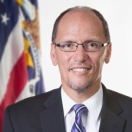
Ed. Note: This blog is cross-posted from the U.S. Department of Labor
When I became labor secretary a little over six months ago, I made increasing the minimum wage one of my top priorities. During the time since, I’ve met with hard-working Americans who’ve shared with me their heart wrenching stories about what it’s like to live on the minimum wage, making constant choices between things like paying the rent or putting food on the table.
In the wealthiest nation on earth, no one who works a full time job should have to live in poverty. That’s a fundamental value proposition, an article of faith in our country that I know an overwhelming majority of Americans agree on.
Today I had the chance to hear from twenty men and women who run businesses, including many who own small businesses. They’ll be directly affected by any increase in the minimum wage. I learned it’s not just workers who support a federal increase; What I heard from these business owners is that raising the wage would help their businesses, too, by putting more money in the pockets of those in their communities. Here’s what a few of them had to say:
Charmington’s Cafe in Baltimore, Md.
Amanda Rothschild runs a small café in Baltimore in which she pays her employees just above the current federal minimum wage, and she does so because it’s good for her bottom line. She told me that when you put more money in workers’ pockets, they stay on the job longer which reduces turnover and training costs: “Our training costs would be significantly higher if we paid lower wages and we had the kind of turnover that you typically see in a restaurant.” She also said that she wants to see an increase in the minimum wage so that more people in her community could spend money in her café.
Emory Knoll Farms in Street, Md.
John Shepley runs Emory Knoll Farms, a small wholesale nursery in Maryland. He makes a strong economic argument for paying those at the bottom of the income ladder a little bit more: “They’re spending 100-percent of their take-home pay in the local economy. It’s recirculating. They’re spending it on rent, groceries, cars, new tires – all the things you need to live.”
Vintage Vinyl in St. Louis, Mo.
Lew Prince runs Vintage Vinyl, a record store in St. Louis and is a survivor in an industry that’s seen a significant downsizing in recent years. He echoed Amanda’s words that increasing the minimum wage would lead to worker retention and a stronger local economy:: “I’m in an industry where 60% of the businesses are closed in the 21st century. If you think about having a relationship with your community and a relationship with your customers, it starts with your relationship to your employees.”
These business owners are not alone. A broader coalition and consensus is emerging. Yesterday I was in Silicon Valley where I met with business leaders and employers who aren’t directly paying any of their workers the minimum wage. But even they understand the issues that affect their bottom line. They want to make sure that people have money in their pockets to buy the products they’re making.
The take-away from these conversations is simple: When we lift the wage floor, it not only betters the lives of those whose wages are directly affected, it also lifts the economy as a whole.
The business leaders I’ve talked to in the last few days shatter the myth that a higher minimum wage hurts the bottom line. They know that our economy is powered by consumer demand, and it will benefit from more money in the pockets of working families who will spend it on goods and services. Better than anyone, business leaders know that leads to business growth and job creation. It’s time Congress acted to #raisethewage.


